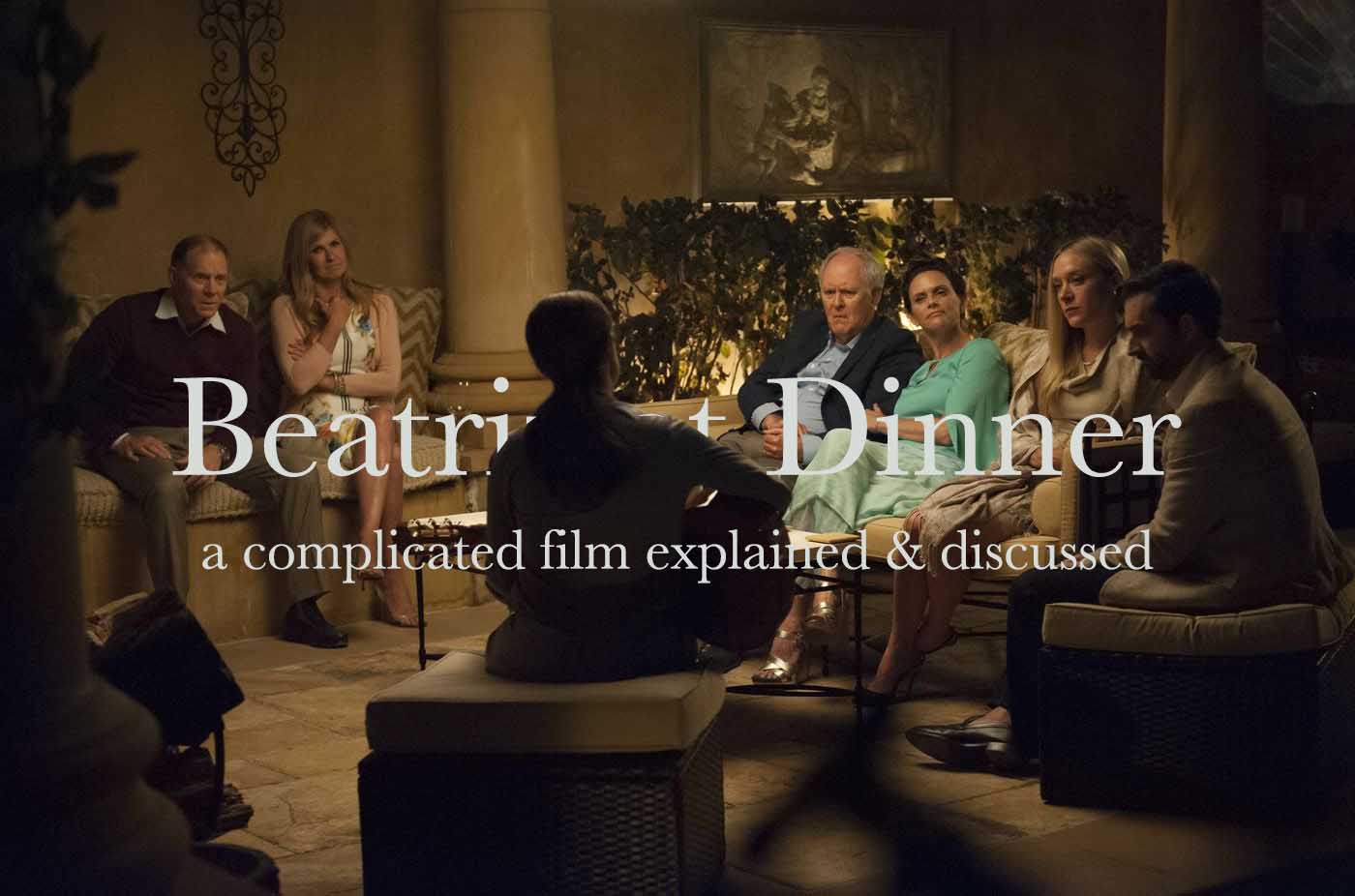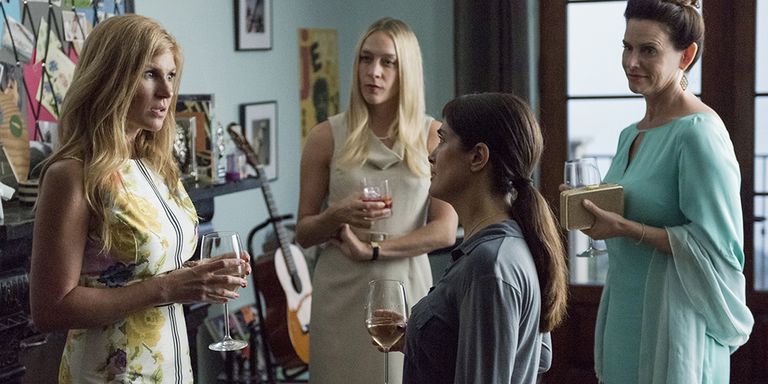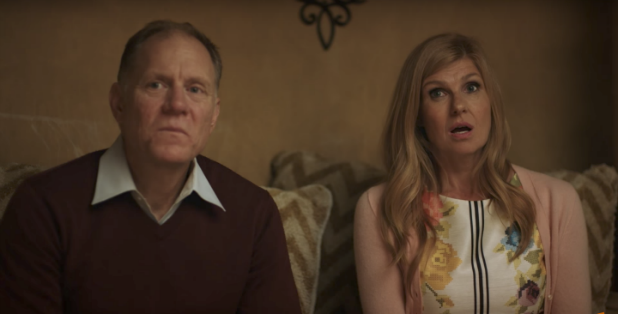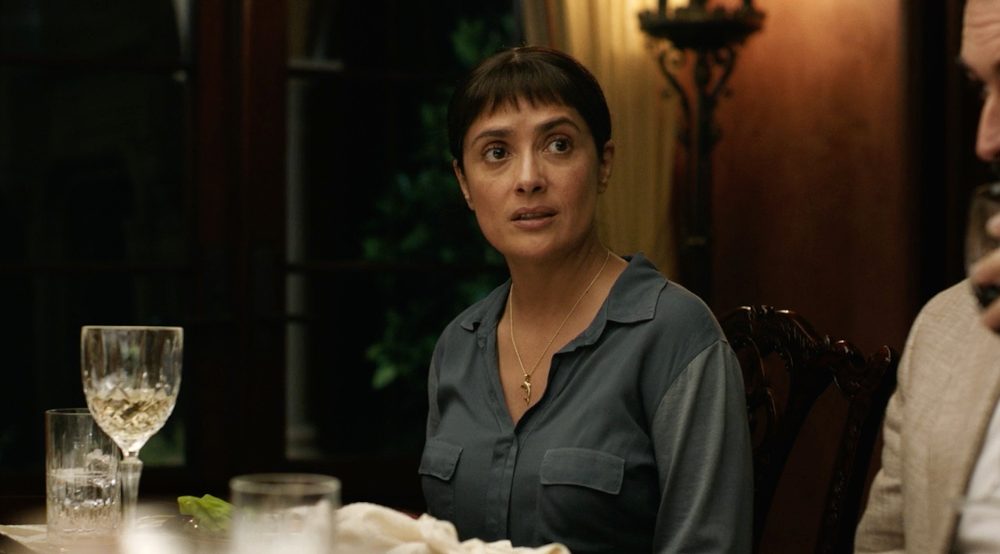Beatriz at Dinner A Complicated Movie on Selfishness Explained. A couple of months ago, I thought myself the epitome of clever when I setup the movie recommendation feature here on THiNC. “Oh everyone will love it” I thought. “Perfect”, I thought. I assumed that together, you and I, we would find the next Shane Carruth. Together, you and I, we would uncover a veritable cornucopia of cinematographic delights. But instead… instead, I think you guys are trolling me with it. Some of you are pulling pins on political hand grenades, tossing them into my lap and giggling like maniacal lunatics.
Of this, I am certain.
For example, this latest movie I just finished watching. Beatriz at Dinner? Holy hand grenades Batman! Geeze. Are you kidding me? Hahahaha. But, not one to shy away from controversy – I took up the gauntlet. I mean? How could I not? But look… I pledge to you, I will try and learn from this movie – as long as you do as well. And in the comments? (Oh holy night.) You guys are going to have to operate from a position of listening and understanding. Because otherwise? This thing will turn into an unholy crusade, and the next thing I know, there will be body parts and shrapnel strewn throughout the remnants of what was THiNC. Ok? But if you haven’t seen it yet, you really need to watch it now with one of these links right here:
Necessary Taylor Holmes Background
This site is a hobby. Like, you guys think I’m joking when I say that. But I literally mean it. Maybe someday I’ll make enough from the ads to actually pay for the hosting, etc, but I literally mean it. It’s a labor of love because there is nothing in this world I enjoy more than complicated movies. And so normally, when I talk about new movies, I give warnings of spoilers, and then I begin firing fusillade after fusillade until I’m done. And being a hobbyist, I’m beholden to no one. I say what I want, about what I want. But it also means that I can heave truth on whatever topic I want. Right? And a discussion on a movie that discusses privilege, money, left and right wing politics is no different. But it would help you to understand where I am coming from.
To say I grew up a full-tilt Republican is the understatement of the year. I literally believed the idea that I should be empowered to do as much with what I have as I can. That the government should absolutely empower individuals and do as little to take away their rights as possible. That humans are so clever, and so infinitely capable, that we should not hinder them in anyway. And So I believed in small, small, small, government. I believed in decreasing taxes at all costs. And I believed that capitalism (not democracy) was the government of choice. (This isn’t hyperbole, I promise you.)
And I was active. I was a founding member and president of my first college’s Young Republicans group. My father, being a lobbyist, meant I knew people in the Senate and Congress that would allow me to act to support these beliefs. Heck, I worked for Senator Grassley of all people! Don’t know him? The conservative Senator from Iowa, and head of the Judiciary committee? I literally was going to go and get my law degree from the University of Chicago solely so that I could work as a Chief of Staff for Senator on the Hill. Ok? So yeah, I was pretty full tilt when it came to politics.
But somehow (this is a story for another day) I ended up in a career doing crazy technology stuff instead. Not only that, but I have been doing it to support a non-profit that helps desperate children – living in the most squalid conditions imaginable – in under developed countries around the world. And if you are doing this kind of a job (and paying attention while you are doing it – because I know plenty of people that are still hardcore Republicans) you quickly begin to change many of the assumptions you have made at a younger age. And for me, I began to realize just how incredibly privileged I have been, and how my assumptions have led me to incredibly myopic vantages. For example, if I were to lose my job, I’d have available to me like five different safety nets before I was destitute. Above and beyond unemployment, I could liquidate my retirement fund, the various stocks I have squirreled away, our parents, then I could begin begging my friends, and the like. But take someone born in different circumstances than myself. One car accident later they’d be out of work, and all but on the street. The buffer and safety zone for someone like that is near zero. And this movie is all about those differences – those advantages and disadvantages.
Quick Beatriz at Dinner Overview & Explained
The concept of Beatriz at Dinner is deceptively simple. The entire movie is just a simple setup in order to crash two different cultures, lifestyles and zeitgeists into each other. Violently. This setup is so simple in fact, that when I told my wife and my kids about it while at lunch the other day, to a person they said – that’s it? That’s what it’s about? How can that be a movie? But yes, yes it can, and though deceptively simple, it is a really powerful movie overall.
99% of this movie is the setup. Beatriz, a poor naturalized immigrant from Mexico is doing all she can to make ends meet. But she has a good job working with cancer patients and helping with their recovery. Kathy (played by Connie Britton), a really extraordinarily well off individual, met Beatriz when her daughter was recovering from her cancer surgery. Beatriz, heads over to give Kathy a massage, and her car decides not to start.
In a simple car failure, we are setup for the collision of a life time. Kathy, indebted to Beatriz, decides to invite her to stay for the business dinner she’s been working on for the past several weeks. (And by “working on” I mean, giving direction to the help to create.) Grant, Kathy’s husband (played by David Warshofsky), is decidedly against Beatriz’s inclusion, but at the end of the day, what is he going to say? And so Kathy invites her to stay for dinner.
Beatriz at Dinner Attendees
Kathy and Grant are the hosts of a dinner part to celebrate a business success for a shopping center development. Doug Strutt, the money that pulled the development together, has a history of many many development railroadings and property expeditions that appear to maybe boarder on the lower end of the moral continuum. Maybe even well off the end of the metaphorical slippery slope. Doug’s wife? (Doug’s third wife?) Is Jeana. The other couple attending the dinner? Alex and Shannon, an up and coming power couple, Alex being the member of the team that managed to finagle the legislation necessary to make the development possible. And Shanon, a career type that jokes about hating holding her baby in the middle of the night after having to let their most recent nanny go.
(Quick aside. Alex, is played by Jay Duplass, as in, one of the two Duplass brothers responsible for some of the best independent mindjob movies available today. And Mark Duplass (the other) was given special thanks in the credits as well. Did he consult on the film? Anyone know? I’d love to know how Jay and Mark helped with the development of this movie if you happen to know. Oh, and if you know the brothers, I’ll buy you a beer if you somehow get me an interview with them! Ok, enough with the whispering.)
But as the dinner starts and we start to see what this group is celebrating we realize that there is going to be a dramatic conflict coming. That something bad is going to happen. Beatriz is realizing that her “friendship” with this family may just have been ill advised. When the conversation turns to Doug’s coming trip to Africa to go on a safari in order to kill big game animals. And when Doug sends his phone around the table showing a huge rhinoceros that he killed on his last trip Beatriz chuck’s Doug’s phone at him.
Hoping to deescalate the confrontation, Kathy suggests that Beatriz head to bed. But instead of sleeping, Beatriz reads more about Doug and his horrible and unscrupulous business practices. Endangered animals. Unprincipled responses to labor disputes. Cutting corners and bypassing laws wherever possible. Doug and his businesses have definitely been out to do one thing and one thing only, and that is to amass large quantities of wealth.
Eventually Beatriz comes back down, carrying a guitar, and interrupting the evening to sing a song for the party like she promised to do at the opening of the movie. Now though, Kathy is worried about what is about to happy if she lets Beatriz sing. But how can she really stop her? And yet, the song, song in Spanish is actually a huge hit. The song, which Beatriz introduces in English, is about our desires to return to home, and the simpler things of life, but that those things are long gone.
Insert Introspective Intermission Here
Money and wealth is such a touchy, touchy, topic of conversation. When people feel challenged, walls go up. When people’s standard of living is challenged, they entrench and become irrational. Me too. I do this too. If you were to threaten my family, I’d probably do whatever it took to protect them. And when someone comes along with a movie specifically in order to shake up those assumptions and value statements it really isn’t going to do a ton of great things for family gatherings and holiday get togethers. For example, this movie recommendation got down-voted more than any other before I decided I wanted to watch it, to see what the fuss was all about. And now I totally get it. But if everyone gave 10% to the under privileged around the world (heck, the under privileged of down the street!) the world would be a significantly better place.
I visited a church once. (Congrats Taylor. No wait, this is a good story.) And at this church, on this particular Sunday, we were coming to bring aid to many in their community. Food, supplies, volunteer labor, you know the drill. But on this Sunday, it was their yearly offering to give to a church that was several hours away, “That was really destitute, and in serious need.” They managed to raise hundreds of dollars for this other community. (Gotta be honest, I called back home and told my wife that the kids weren’t getting gifts from this trip (I generally always bought something local to bring home for the kids on these trips) and instead, that money was going to go to this offering.) Everyone can push to give to those that are less privileged.
Beatriz and Her Denouement
Which brings us back to Beatriz, and her coming collision with this unsuspecting enclave. After Beatriz’s song, that was surprisingly well received considering, Beatriz tells Doug,
“I thought you were that man. I thought that fate had brought us together.”
“For what?” Doug asked.
“To kill you, revenge maybe. But you aren’t that man.” she answers.
And as she continues her low key, and measured polemic, she lets Doug and the rest of the party know that it is much harder, and infinitely more rewarding to heal than it is to destroy. And that you know what? Maybe it would be better to destroy the source of all this pain the world is encountering. And Doug, caught off guard by this angst pointed his direction, says, “Me? She thinks I’m the source.”
And with that comes well-cooked hand grenade from Beatriz, “I think all your pleasure is built on other’s pain.”
And blam, with that, Grant kicks her out and calls for a tow for her car. And while she is waiting for her car to get connected, Doug comes out by her and smokes a joint. “How many years til we are dead? 20, 30? We are dying. The animals are dying. The bees, the world is dying. We should try and accept it and enjoy ourselves.” Epicureanism. We are dying so shove anything and everything into your gullet. We are dying so have sex with anything and everything you can. We are dying to pilfer, steal, hoard everything you can to enjoy every last minute, every last second we have before we head off into the long dark good night. Right?
Yeah, Beatriz doesn’t do well with this argument. So she heads into Grant’s office and grabs a letter opener and stabs Doug in the neck, and holds him until he’s dead.
But then Beatriz walks into the foyer, with Doug standing there on his cell phone, and she drops the letter opener loudly onto the floor, sending a very very clear signal what she had been considering doing. So she had been invisioning what it would be like to kill this man… she was considering seriously killing him, but instead she chose not to do it. And she heads out to the tow truck and heads out.
And along the coast, she tells the driver to stop, where she climbs down to the beach, and walks into the waves.
Explain Beatriz at Dinner and What the Ending Means!
You understand this movie better than you think you do. We’ve all been at dinner parties stuck talking to that one incredibly annoying person, incessantly talking about Roswell New Mexico or whatever. Tax law. Right? Beatriz is that one person. But that person is a compassionate idealist that is doing her best to heal those around her, and to make a positive influence on the world. But she talks about those in power, and how they believe they have every right, are entitled to abuse their power… that morality has no sway on them or on their actions. Goodness has no sway on them. Just simple greed and raw consumeristic, ravenous, materialism. The maw of their greed knows absolutely no end.
She tells the tow truck driver, “That man killed my goat.” Did she literally mean that Doug climbed into her backyard while she was away for work and killed her goat? No. She meant that Doug, and men like him, her entire life, have gone on a goat killing spree in her life. Her childhood community that was destroyed by a man like Doug, even if it wasn’t Doug. Killed her opportunities for decent pay and decent health care once arriving in America. Has continued asking her to fetch her a drink, and continuously confused her for the help. And literally like the man that killed her goat that lived along her street, an uncaring, uncompassionate individual, that cares more about erecting community bylaws that protect his comfort than caring for the least of these.
So when Beatriz stabs Doug in the neck, she is fantasizing about killing her worst enemy. Not worst enemy singular, enemies plural. A system. She is fantasizing about shivving a zeitgeist and a culture that systematically prioritizes consumerism and selfishness over compassion and caringness. That denigrates the healers, and promotes the narcissistic destroyers – heck, it actually deifies them.
But what about that ending?! I hear you screaming at your phone. You know, the ending where Beatriz goes for a swim at the end? Eh? What is that about? Well, first, if you literally thought that Beatriz went for a swim to decompress after her stressful day, good for you. hahahaha. You are a sweetheart. No. Beatriz actually went down to the beach to drown herself. WAIT WHAT? WHY? Well, depending on how you view the movie, there might be several different reasons. But the one that seems the most on target is that Beatriz was a compassionate soul, hellbent on healing and pouring out her life for others. It was the thing she stated gave her satisfaction. But could it be that Beatriz was just pushed beyond all measurable reasonableness by Doug and the other dinner party guests? Could it be that her sensitive spirit was completely consumed by the darkness and selfishness of the other dinner guests? Maybe it was absolutely everything she could do to refrain from killing him. Remember she said that it might be better to kill the root of all this pain she has been trying to heal. But maybe she realized that the roots, the generators of this pain and intense myopy were too prevalent, too powerful, to ubiquitous?
Miguel Arteta, the director of Beatriz at Dinner, chose to give you an ending that trusted you to think for yourself. (And kudos to him for that.) Has created a movie that speaks specifically against our culture and specifically against our myopic selfishness at the expense of all else. But he’s created it in such a way that he’s said to the coddled infants in the theater, I’m done spoon feeding you… it’s time to start thinking for yourselves. So, what do you think the ending means? I’ve told you what I think. Now, it’s time for you to come up with your own ideas and theories about what it might possibly mean.




